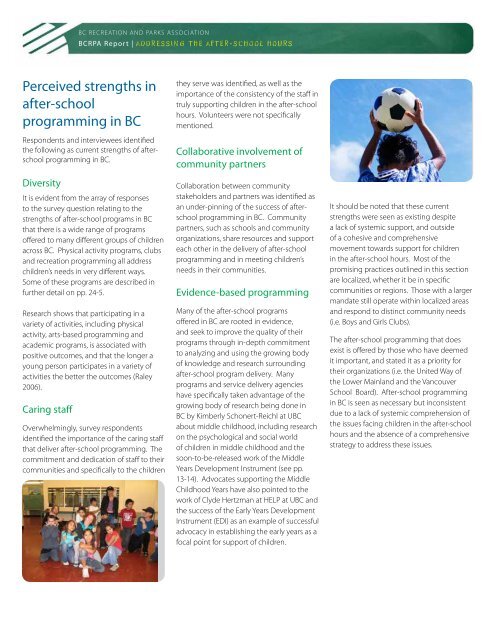BCRPA Report: Addressing the after-school hours - Middle ...
BCRPA Report: Addressing the after-school hours - Middle ...
BCRPA Report: Addressing the after-school hours - Middle ...
Create successful ePaper yourself
Turn your PDF publications into a flip-book with our unique Google optimized e-Paper software.
26 | www.bcrpa.bc.ca<br />
BC RECREATION AND PARKS ASSOCIATION<br />
<strong>BCRPA</strong> <strong>Report</strong> |<br />
Perceived strengths in<br />
<strong>after</strong>-<strong>school</strong><br />
programming in BC<br />
Respondents and interviewees identified<br />
<strong>the</strong> following as current strengths of <strong>after</strong><strong>school</strong><br />
programming in BC.<br />
Diversity<br />
It is evident from <strong>the</strong> array of responses<br />
to <strong>the</strong> survey question relating to <strong>the</strong><br />
strengths of <strong>after</strong>-<strong>school</strong> programs in BC<br />
that <strong>the</strong>re is a wide range of programs<br />
offered to many different groups of children<br />
across BC. Physical activity programs, clubs<br />
and recreation programming all address<br />
children’s needs in very different ways.<br />
Some of <strong>the</strong>se programs are described in<br />
fur<strong>the</strong>r detail on pp. 24-5.<br />
Research shows that participating in a<br />
variety of activities, including physical<br />
activity, arts-based programming and<br />
academic programs, is associated with<br />
positive outcomes, and that <strong>the</strong> longer a<br />
young person participates in a variety of<br />
activities <strong>the</strong> better <strong>the</strong> outcomes (Raley<br />
2006).<br />
Caring staff<br />
Overwhelmingly, survey respondents<br />
identified <strong>the</strong> importance of <strong>the</strong> caring staff<br />
that deliver <strong>after</strong>-<strong>school</strong> programming. The<br />
commitment and dedication of staff to <strong>the</strong>ir<br />
communities and specifically to <strong>the</strong> children<br />
<strong>the</strong>y serve was identified, as well as <strong>the</strong><br />
importance of <strong>the</strong> consistency of <strong>the</strong> staff in<br />
truly supporting children in <strong>the</strong> <strong>after</strong>-<strong>school</strong><br />
<strong>hours</strong>. Volunteers were not specifically<br />
mentioned.<br />
Collaborative involvement of<br />
community partners<br />
Collaboration between community<br />
stakeholders and partners was identified as<br />
an under-pinning of <strong>the</strong> success of <strong>after</strong><strong>school</strong><br />
programming in BC. Community<br />
partners, such as <strong>school</strong>s and community<br />
organizations, share resources and support<br />
each o<strong>the</strong>r in <strong>the</strong> delivery of <strong>after</strong>-<strong>school</strong><br />
programming and in meeting children’s<br />
needs in <strong>the</strong>ir communities.<br />
Evidence-based programming<br />
Many of <strong>the</strong> <strong>after</strong>-<strong>school</strong> programs<br />
offered in BC are rooted in evidence,<br />
and seek to improve <strong>the</strong> quality of <strong>the</strong>ir<br />
programs through in-depth commitment<br />
to analyzing and using <strong>the</strong> growing body<br />
of knowledge and research surrounding<br />
<strong>after</strong>-<strong>school</strong> program delivery. Many<br />
programs and service delivery agencies<br />
have specifically taken advantage of <strong>the</strong><br />
growing body of research being done in<br />
BC by Kimberly Schonert-Reichl at UBC<br />
about middle childhood, including research<br />
on <strong>the</strong> psychological and social world<br />
of children in middle childhood and <strong>the</strong><br />
soon-to-be-released work of <strong>the</strong> <strong>Middle</strong><br />
Years Development Instrument (see pp.<br />
13-14). Advocates supporting <strong>the</strong> <strong>Middle</strong><br />
Childhood Years have also pointed to <strong>the</strong><br />
work of Clyde Hertzman at HELP at UBC and<br />
<strong>the</strong> success of <strong>the</strong> Early Years Development<br />
Instrument (EDI) as an example of successful<br />
advocacy in establishing <strong>the</strong> early years as a<br />
focal point for support of children.<br />
It should be noted that <strong>the</strong>se current<br />
strengths were seen as existing despite<br />
a lack of systemic support, and outside<br />
of a cohesive and comprehensive<br />
movement towards support for children<br />
in <strong>the</strong> <strong>after</strong>-<strong>school</strong> <strong>hours</strong>. Most of <strong>the</strong><br />
promising practices outlined in this section<br />
are localized, whe<strong>the</strong>r it be in specific<br />
communities or regions. Those with a larger<br />
mandate still operate within localized areas<br />
and respond to distinct community needs<br />
(i.e. Boys and Girls Clubs).<br />
The <strong>after</strong>-<strong>school</strong> programming that does<br />
exist is offered by those who have deemed<br />
it important, and stated it as a priority for<br />
<strong>the</strong>ir organizations (i.e. <strong>the</strong> United Way of<br />
<strong>the</strong> Lower Mainland and <strong>the</strong> Vancouver<br />
School Board). After-<strong>school</strong> programming<br />
in BC is seen as necessary but inconsistent<br />
due to a lack of systemic comprehension of<br />
<strong>the</strong> issues facing children in <strong>the</strong> <strong>after</strong>-<strong>school</strong><br />
<strong>hours</strong> and <strong>the</strong> absence of a comprehensive<br />
strategy to address <strong>the</strong>se issues.


